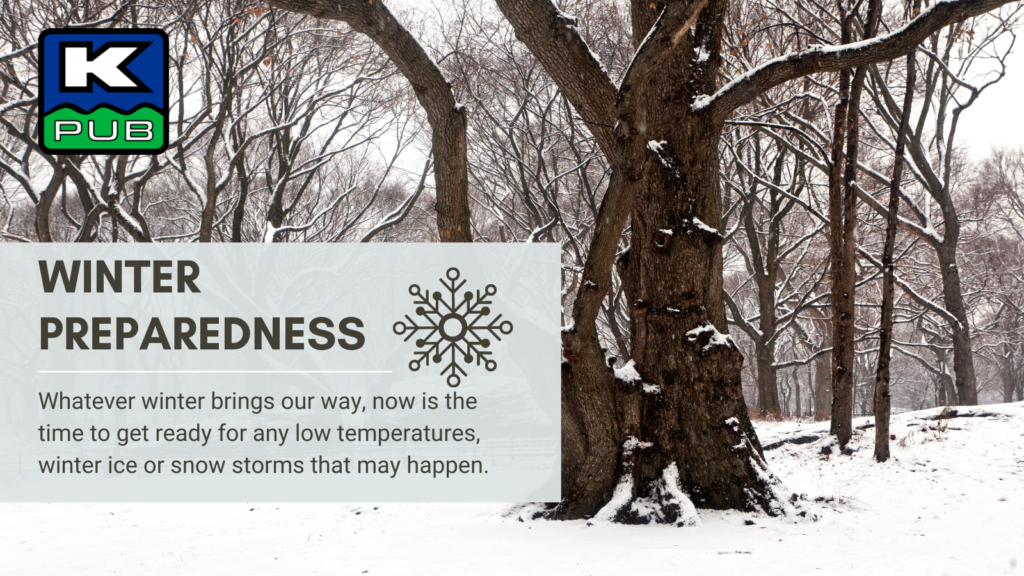 Although it may not feel like it quite yet here in Central Texas, winter is now here! Whatever winter brings our way, now is the time to get ready for any low temperatures, ice or snowstorms that may happen.
Although it may not feel like it quite yet here in Central Texas, winter is now here! Whatever winter brings our way, now is the time to get ready for any low temperatures, ice or snowstorms that may happen.
In a winter storm emergency, restoring power and heat to our customers is always the highest priority. Our line workers will work around the clock to restore power as quickly as they safely can—even so, it can take days to repair the devastating damage of a winter storm.
Planning ahead is the best thing to do to keep yourself and your family safe in extreme winter weather conditions. It also will ensure that you avoid any rushes as well as the supply shortages that often occur just prior to a severe winter weather event. We encourage you to think back to February and make a list of what you needed most, whether you had power or not.
THINGS TO DO NOW:
Be prepared for inclement weather well in advance before it happens. Make your safety a priority and start planning early with the following items below:
Prepare an emergency kit & stock up on essentials
Emergency preparedness experts recommend keeping enough food, water and other essential items on hand to last your family at least 72 hours or longer during an outage. A few things to include are:
- Food: Store food that does not require cooking, such as canned goods, crackers, dehydrated meats and dried fruits.
- Bottled water: Keep an ample supply of bottled water on hand. Ready.gov recommends 3-5 gallons per day.
- Medication: Be sure to maintain adequate supplies of prescription medicine in the event of a major winter storm or extended power outage.
- Other items: First aid kit, blankets, flashlights, lanterns, batteries, matches, cell phone charger, power bank/power station, all-weather battery-operated radio and pocket heaters or hand warmers. Stock up on kindling and dry firewood for an additional heat source if you have a fireplace or woodstove.
- Phone: If you have a telephone system that requires electricity to work, such as a cordless phone, plan to have a standard telephone or cellular phone ready as a backup.
- Pets: Don’t forget your pets’ needs and have supplies on hand for them, too.
Consider a generator for medical needs
While KPUB encourages customers with medical needs to make sure that our utility is aware of their situation, you still need to have a plan in place for an alternate power source in the event of an outage. We cannot guarantee power for any customer—even those with medical needs—and there is no guarantee that customers with medical conditions will have their power restored immediately, especially during emergency outage events.
Those who rely on medical equipment need to be extra prepared. Your emergency preparedness kit should include additional oxygen tanks, equipment batteries or other backup equipment, and if possible, a stand-up generator or a portable generator as an alternate power source. Learn more here.
Download KPUB’s SmartHub app
When a storm hits, you’ll have quick access to report your outage 24/7 right at your fingertips with our KPUB SmartHub app—and it’s completely free!
Sign up for text alerts—stay on top of power outages with text updates
KPUB now offers a two-way text messaging service to report and receive updates on an outage. Sign up today to receive these messages from KPUB by adding your mobile phone number to SmartHub or call 830.257.3050 and verify your mobile phone number to ensure you receive these important messages. Learn more here.
BEFORE A STORM:
- Keep your cellphone fully charged.
- Update the weather-stripping in your home if needed, and seal any cracks around windows and doors to prevent more cold air from coming inside.
- If you have an electric garage door, find the manual release lever and know how to operate it.
- Keep your vehicle’s gas tank full. Gas stations reliant on electricity to power their pumps might be out of service.
- Keep your faucets on a slow drip to keep pipes from freezing. Catch the dripping water in a clean container, sink, or tub to use if your water system is impacted. If your pipes freeze, turn off the main water supply to prevent further damage.
- Fill a bathtub for a supply of nondrinking water.
- Fill plastic containers with water and place them in the freezer if there’s room. The frozen water will help keep food cold during a temporary power outage.
- If you have an additional heating source, like a fireplace, be sure that it’s clean and working properly before using it.
- Always keep a multipurpose, dry-chemical fire extinguisher nearby and know how to use it.
DURING A STORM:
Follow KPUB on social media
Monitor our KPUB social communications for potential energy conservation alerts and follow guidelines when you are able. We’ll provide important, real-time updates whenever possible on the following social media communication channels:
Conserve your heat
• Pick the lowest temperature you’re comfortable with and set your thermostat there — 68 degrees or lower is recommended. When you’re not home, keep your thermostat set at 60 degrees.
• Close off unneeded rooms to help warm your home faster.
• Keep drapes and blinds closed, except when windows are in direct sunlight.
• Stuff towels in cracks under doors.
• Stay inside and dress in warm, layered clothing.
Additional important winter weather safety tips:
• Be cautious going outside. Power lines and other energized equipment could be hidden by snow, ice and debris.
• Treat all downed power lines as energized and dangerous. Downed power lines do not have to be sparking, arcing or moving to be dangerous.
• Watch weather reports closely. Keep your all-weather radio nearby and listen to local media reports for the most up-to-date weather and safety information.
• Check on elderly or disabled friends and neighbors.
If you experience a power outage:
• Before calling us to report a power outage, check your home’s panel box. A blown fuse or tripped circuit breaker could be at fault.
• Keep lights and appliances off to avoid overloading circuits when power is restored. Instead, leave only one light on as a signal so that you know when your power returns.
• Turn off or disconnect appliances, equipment such as air conditioners, and electronics that were in use when the power went out.
• Use flashlights for emergency lighting. If you must use candles, keep them away from items that can easily catch fire, such as drapes and lampshades. Keep them out of the reach of small children and do not leave candles unattended.
• Keep refrigerator and freezer doors closed to keep your food as fresh as possible. As a rule of thumb, 25 pounds of dry ice will keep a 10-cubic-foot freezer at the proper temperature (32 degrees F) for three to four days. When in doubt, throw it out. Read the FDA guidelines for keeping food safe during outages.
• Keep a close watch on the temperature in your home and check it often.
• Don’t use your stove or oven for heat. Gas stoves and ovens produce carbon monoxide, and electric ones pose a fire risk when not used as designed.
• When using an alternative heat source, follow operating instructions, use fire safeguards, and be sure to ventilate properly.
• Don’t run your car in the garage as a way of warming up. Only run the car outside, and before you start it, make sure that the exhaust pipe is clear of snow and debris. Taking these steps could save you and your family from carbon monoxide poisoning.
• If outages are prolonged, consider staying with friends, family, or in a local shelter.
Use portable generators safely:
Keeping a portable generator on hand in case of a lengthy power outage is a great way to maintain access to electricity, but generators can also be extremely dangerous if not installed or used properly.
Before reading these tips, always read the owner’s manual and instructions for your generator. Carefully follow all instructions and warnings in order to safely start and operate the generator. Do NOT cut corners when it comes to safety.
• If you decide to use a portable generator during an outage, make sure it is placed outside of the home for proper ventilation (never use it inside your home or garage).
• Never run a generator closer than 20 feet from the doors and windows to prevent fumes from entering the home.
• Keep your generator dry. When using a generator, make sure it is on a dry surface under an open structure. You should also make sure your hands are completely dry before touching your generator. Do not use a generator in wet, rainy weather.
• Disconnect the power coming into your home or business. Before connecting a generator, disconnect your regular source of power. Power from your generator could be redirected back to KPUB utility lines creating a dangerous situation for KPUB linemen. You may then start the generator before connecting appliances.
• Never connect a portable generator to your home’s electrical system unless it’s done by a licensed electrician. If you use a generator, connect the equipment you want to the outlets on the generator.
• Use a heavy-duty extension cord to connect electrical appliances to the outlet on the generator.
• Have an appropriate supply of fuel on hand. Assess how much fuel you can store safely and for how long. Gas and diesel may need chemicals added to them after being stored for long periods of time to ensure they are still safe to use. All fuels should be stored in fuel containers in a cool, dry, well-ventilated area.
• Turn off your generator and let it cool down before refueling (never refuel while it is in use)
• Inspect regularly and perform maintenance on your generator when needed. Check your generator’s tanks, pipes, and valves for damages or wear and replace materials as necessary. Schedule at least one maintenance service every year to ensure your generator is running correctly. Use fresh fuel in your generator and run it every so often to ensure it will be set when you need it.
